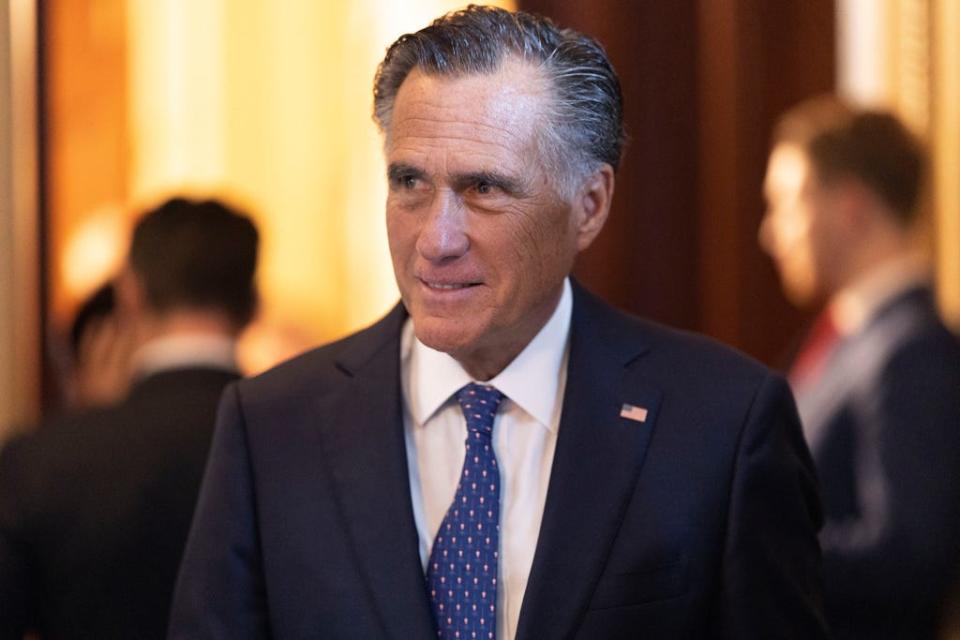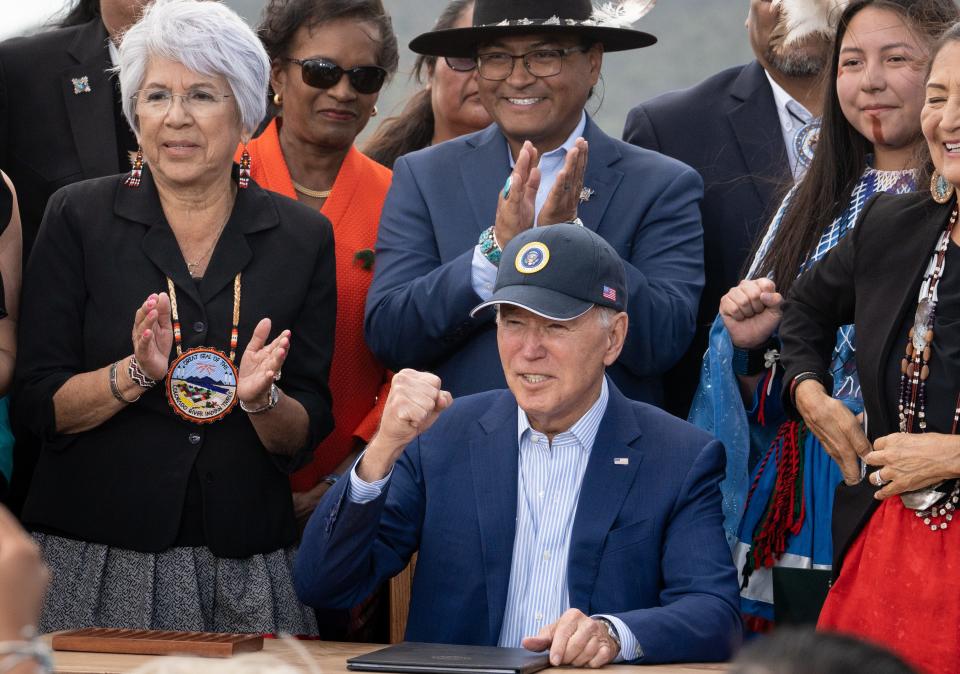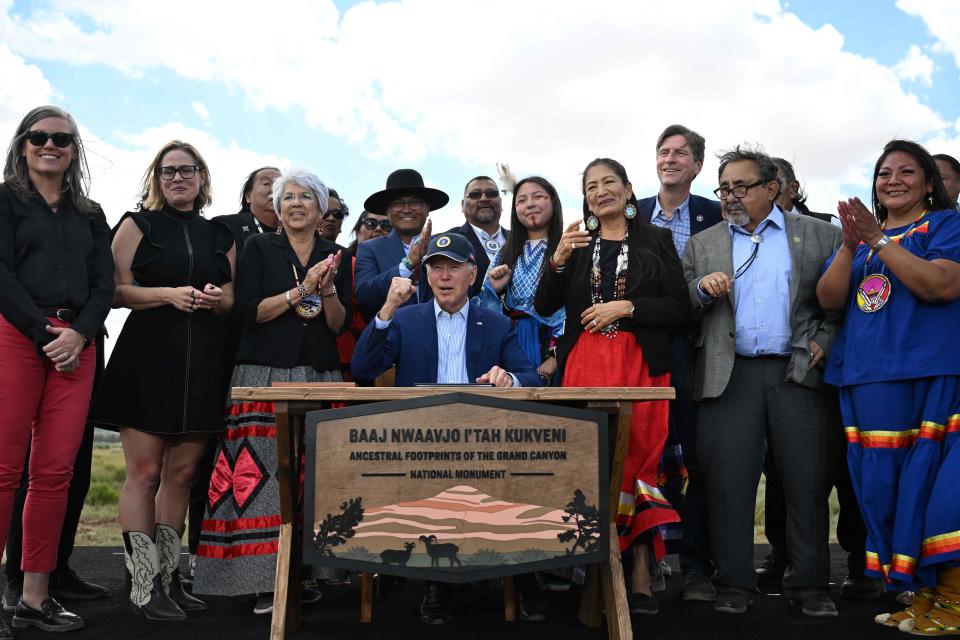Republicans in Utah, elsewhere, blast Biden over Grand Canyon monument designation
- Oops!Something went wrong.Please try again later.
Republican lawmakers in Utah blasted President Joe Biden over his designation of a new national monument near the Grand Canyon, arguing that while the monument is inside Arizona, it would have major economic repercussions on the other side of the state line.
Biden visited a windswept sage flat at this sacred Havasupai landmark on Tuesday to proclaim it and nearly 1 million acres of federal lands as Arizona’s newest natural preserve, Baaj Nwaavjo I’tah Kukveni – Ancestral Footprints of the Grand Canyon National Monument.
The new monument north and south of Grand Canyon National Park is meant to protect against future uranium mining claims and to honor 12 Native American tribes for whom the canyon and surroundings are a cultural and spiritual touchstone. Biden said protecting it honors them and all Americans who will enjoy the lands in the future.
“It is good for the soul of the nation,” the president told a crowd of more than 200 dignitaries, many of them members and leaders of Arizona’s diverse tribes or environmental groups who had worked decades to make the monument happen.
Related story: Biden designates a new national monument on sacred tribal lands near the Grand Canyon
But much of the monument resides north of the Grand Canyon, in the "Arizona Strip" area closely connected with communities across the state line in Utah, and politicians there have argued it would hurt local economies in Washington and Kane counties. Uranium mining companies have proposed digging into the region's vast reserves as a way to supplement the nation's uranium supplies.
Republicans also argued the designation was the latest in a series of recent overzealous uses of a federal law that allows presidents to proclaim monuments.
"National monuments have become a political football tossed back and forth as presidential administrations change," U.S. Sen. Mitt Romney, R-Utah, said in a written statement. "President Biden’s proclamation of 1.1 million acres around the Grand Canyon in Arizona as a national monument continues the cycle of Antiquities Act abuse by the Executive Branch."
The Antiquities Act has been the subject of debate for decades around the sparsely populated areas along the Utah-Arizona border, where two other monuments, the Bears Ears and Grand Staircase-Escalante national monuments on the Utah side, were created by Democratic presidents and opposed by Republicans.
Utah's other U.S. senator, Mike Lee, also a Republican, called the designation "a disturbing trend toward top-down management that Democrat presidential administrations have consistently showcased."
"This approach not only overlooks the value of local input but also disrupts the delicate balance between conservation and practical realities," Lee said. "It's time for President Biden to reflect, revisit his tactics and release the chokehold currently suffocating local livelihoods and our domestic energy production."

Some ranchers and Republican politicians in Mohave County voiced loud objections to the monument, calling an emergency meeting on Monday in Kingmon to formally protest the move.
Multiple ranchers attended the meeting spoke out against the monument including Mike Gannuscio, the President of the Arizona Cattle Growers' Association. A representative from the Arizona Farm Bureau also spoke in opposition.
The federal government said no private land will be taken for the monument. However, during the meeting, rancher Chris Heaton presented maps that showed the proposed land monument would include property that his family has owned and worked on since before Arizona was a state.
"This is personal," Heaton said. "They're coming after our ranches, our livelihoods, our jobs, our homes."
Heaton said he was never contacted by anyone about the proposed monument in relation to his land.
"This is un-American," he said. "We do not come after people's jobs and private property in this country."
Grand Canyon protections
The monument designation covers federal lands including parts of the Kaibab National Forest and rangelands administered by the Bureau of Land Management. It does not include private or state lands and will not affect livestock grazing leases or recreational access on its federal lands, administration officials said. Trout Unlimited was among those praising the move on Tuesday.
Biden delivered his remarks on Tuesday at Red Butte, a knob jutting out of the shrubland flats south of Grand Canyon and north of Williams. It’s a traditional gathering place for the Havasupai people, some of whom say elders call it “the abdomen of the Earth,” and is about 6 miles from the recent focus on anti-uranium activism at Pinyon Plain Mine. The area, which has been managed as part of the Kaibab National Forest until now, grows a mix of piñon-juniper and ponderosa pine stands, broken up by sweeps of tallgrass and sagebrush.
The Havasupai Tribe on Tuesday released a statement celebrating the monument and noting that it represents a further restoration of tribal recognition on lands the tribe lost when federal agencies took over. The Havasupai were removed from the canyon starting in 1882 and regained a reservation surrounded by the national park 70 years later.

The monument is broadly supported by Democratic officials in the state. U.S. Reps. Raúl Grijalva, a longtime proponent of the monument, and Ruben Gallego met the president on the tarmac at Grand Canyon Airport on Monday evening. Gallego said he couldn’t make Tuesday’s formal proclamation, and wanted to thank Biden while also urging him to direct FEMA to aid Arizona with heat disasters that kill more people than many natural disasters.
“This is a real Arizona treasure,” Gallego said of the Grand Canyon region. “It’s a national treasure, and now we’re going to make sure it is in perpetuity.”
Biden visit to Utah

The monument designation could affect the reception Biden receives when he visits Utah on Thursday. He planned to visit Salt Lake City to finish a four-day tour through Western states.
Biden planned to use the three-night trip to "continue to highlight the progress he’s making across his agenda," particularly when it comes to climate change, said Natalie Quillian, the White House deputy chief of staff.
The visit comes as Biden ramps up his 2024 reelection campaign and was seen by some observers as a chance to tout some of his accomplishments at time when former President Donald Trump's legal troubles were dominating the headlines among his Republican competition.
The White House has been pushing to demonstrate the impact of Biden's policies, hoping to harness lower inflation numbers and strong employment figures to alleviate the president's sagging poll numbers.
Contributing: The Arizona Republic.
This article originally appeared on St. George Spectrum & Daily News: Republicans in Utah blast Biden over Grand Canyon monument designation

